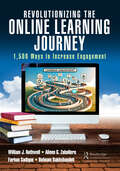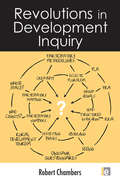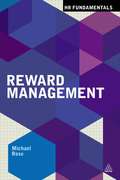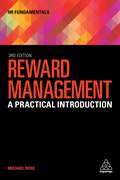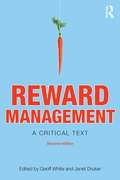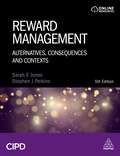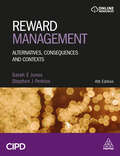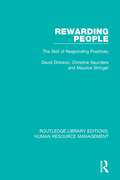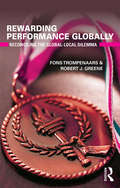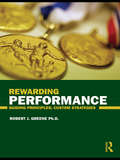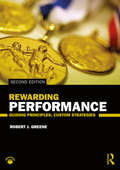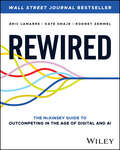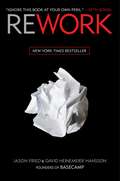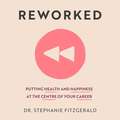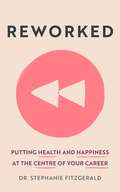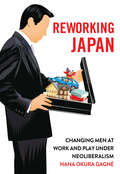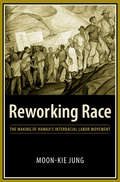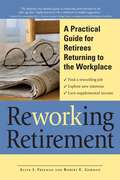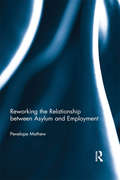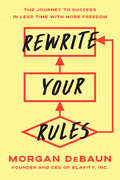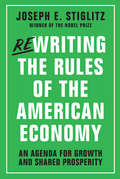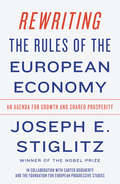- Table View
- List View
Revolutionizing the Online Learning Journey: 1,500 Ways to Increase Engagement
by William J. Rothwell Aileen Zaballero Behnam Bakhshandeh Farhan SadiqueThe fast evolution of education and the expansion of internet resources necessitate increasingly advanced tools and methodologies. Enabling virtual conversations for knowledge dissemination, community development, and connection might promote an explorative strategy. Teachers, trainers, and facilitators must create compelling virtual learning. Critical questions: How can companies engage online learners? How can educators improve virtual learning?A system can undergo substantial alterations when technology is employed as a tool or function. E-learning and m-learning offer new interaction options for learners, trainers, and stakeholders. Innovative technologies can encourage new educational alternatives against conservatism.You've been waiting for Revolutionizing the Online Learning Journey: 1500 Ways to Increase Engagement. This practical guide is for instructors, instructional designers, professional trainers, consultants, and others directly involved in teaching, producing, and leading online learning. The authors' data will reveal a wealth of methods that may make virtual meetings interesting, inclusive, and inventive for all participants. This book offers several ideas and tools that may be simply integrated to keep learners engaged and make learning sessions more engaging. You'll also learn about new learning tools like virtual reality and artificial intelligence to expand your possibilities.
Revolutions in Book Publishing: The Effects of Digital Innovation on the Industry
by Michael Szenberg Lall RamrattanRevolutions in Book Publishing uses dynamic methods to examine the evolution of the industry's transition from physical place to cyber space, analyzing the latest effects of technological innovations on the industry as well as their influence on distribution channels, market structure, and conduct of the industry.
Revolutions in Development Inquiry
by Robert ChambersRobert Chambers returns with a new book that reviews, together for the first time, some of the revolutionary changes in the methodologies and methods of development inquiry that have occurred in the past forty years, and reflects on their transformative potential for the future. This book breaks new ground by describing and analysing the evolution of a sequence of approaches. Starting with the dinosaurs of large-scale multi-subject questionnaire surveys, and the biased visits and perceptions of rural development tourism and urban-based professionals, there follows a look at the explosive proliferation of methodologies and methods of recent years. These include rapid rural appraisal (RRA) participatory rural appraisal (PRA) and dramatic developments in the still largely unrecognized fields of participatory numbers and statistics, and of participatory mapping and GIS. Chambers shows how these can empower local people and provide rigorous and valid substitutes for some more traditional methods of inquiry. Also presented is a repertoire for offsetting the biases of the urban trap, which has become so serious for officials and aid agency staff. Importantly, Chambers points out that we are now in a different space, methodologically, from a few years ago. He makes the case that participatory methodologies, evolved through creative and eclectic pluralism, can be a transformative wave for the future as drivers of personal, professional and institutional change. This book is for all who are concerned with development, regardless of profession, discipline or organization, who seek to be abreast of the revolutionary breakthroughs in approaches and methods of inquiry of recent years, and what Chambers calls their 'unlimited potentials'. Published with IDS.
Reward Management (HR Fundamentals #5)
by Michael RoseReward Management is a practical guide to understanding and implementing really effective reward strategies in your organization. Tailored to the needs of practitioners it uses a combination of practical tools, scenarios and case studies to cover areas including pay grades and structure, job evaluation, pay reviews, bonus plans, non-cash reward, benefits, tax issues and much more. Aligning reward with the strategic objectives of the organization it will equip you with the skills you need to plan, implement and assess a reward strategy in any type of organization.
Reward Management: A Practical Introduction (HR Fundamentals #22)
by Michael RoseHow can I fairly reward and recognize employees and align this with team and organizational performance? Reward Management is a practical guide for understanding how to develop successful reward strategies.It covers key areas including pay and grade structures, job evaluation, non-cash reward, pay reviews, bonus plans and tax issues. Featuring guidance, practical tools and case studies throughout, this book provides the knowledge and skills needed to plan, implement and assess an effective reward strategy in any type of organization.This third edition of Reward Management includes the latest research and developments, such as how to incorporate wellbeing and new technologies in reward strategy and how new ways of working may affect a benefits package. Case studies include insight from McDonald's UK, Marks and Spencer and Which? to show how this can be applied in practice. Online resources include downloadable templates and further tools to be used in practice.HR Fundamentals is a series of succinct, practical guides featuring exercises, examples and case studies. They are ideal for students and those in the early stages of their HR careers.
Reward Management: A critical text (Routledge Studies in Employment Relations)
by Geoff White Janet DrukerThis thoroughly revised edition adopts a critical and theoretical perspective on remuneration policy and practices in the UK, from the decline of collective bargaining to the rise of more individualistic systems based on employee performance. It tackles the conceptual issues missing from existing texts in the field of HRM by critically examining the latest academic literature on the topic. Fully updated to cover the Chartered Institute of Personnel and Development's reward syllabus, and offering a less prescriptive alternative to current texts for HR practitioners and MBA students, this new edition includes: new chapters on executive reward, pensions and benefits clear routes to assist the student reader in the journey through this complex area a strong contextual framework to enable better understanding The second edition of Reward Management is an essential read for all those studying or with an interest in human resource management, performance management and reward.
Reward Management: Alternatives, Consequences and Contexts
by Stephen J Perkins Sarah JonesCovering theory and practice, Reward Management is an ideal textbook for postgraduate HR students, particularly those taking the CIPD Advanced level module in Strategic Reward Management Now in its fifth edition, Reward Management covers everything postgraduate HR students need to know about the topic to excel in their studies and start their careers as people professionals. It covers reward management systems, frameworks and strategies through to pay setting, pensions, benefits and non-financial reward. There is also coverage of the legal and employment relations context of reward management as well as discussion of international reward management. This new edition now includes brand new content on deferred reward, executive reward, the impact of social transformation and the wider economy on reward as well as changes to reward post the Covid-19 pandemic. The content has been fully updated throughout and now includes new discussion of sustainability and equality, diversity and inclusion and how they apply to reward management. This book is supported by examples, case studies and a range of pedagogical features such as learning objectives, self-test assessment exercises, key learning points and explore further boxes. Online resources include a lecturer manual and PowerPoint slides for every chapter.
Reward Management: Alternatives, Consequences and Contexts (Routledge Companions In Business, Management And Accounting Ser.)
by Stephen J Perkins Sarah JonesReward Management is a comprehensive guide to all elements of reward in the workplace. From the theoretical frameworks and legal context of reward through to practical application in the workplace, this book provides all the essential information for both students of reward management and practitioners involved in reward management in organizations. Covering all the key areas of reward management including pay structures and pay setting, job evaluation and employee benefits, Reward Management is a key book for anyone studying the Level 7 CIPD reward management module or a postgraduate qualification in HR. This book also includes guidance on non-financial reward and new coverage of the gender pay gap, executive reward and pay ratio reporting. There is also extensive discussion of international reward including the impact of different cultures on reward, benefits for multi-local talent, rewarding expatriates and why one size of reward doesn't fit all. Accompanying online resources include lecturer guides, lecture slides and multiple choice questions for students.
Rewarding People: The Skill of Responding Positively (Routledge Library Editions: Human Resource Management)
by David Dickson Christine Saunders Maurice StringerPeople's behaviour can be rewarding to others through what they say or do: it may be no more than an appreciative smile, a sympathetic touch or a word of praise, but the impact can be highly significant. This book, first published in 1993, explores these social rewards and their relevance to the practice of people in the interpersonal professions. While much of its content is relevant to everyday life, the focus is on ways in which an understanding of the working of social rewards can benefit such groups as teachers, doctors, social workers, counsellors, nurses and managers in their interaction with their patients, clients and pupils. In exploring the nature and distribution of social rewards, the authors introduce the concept of interpersonal skill, and discuss a range of theoretical perspectives to account for the consequences of responding positively to others. The effects of promoting interpersonal attraction, the establishment and regulation of relationships, and the ethical issues involved in conferring power and facilitating influence are also discussed. With its discussion of theory and research linked to explicit practical applications, Rewarding People will be of interest to students in the areas of communication, psychology and business studies.
Rewarding Performance Globally: Reconciling the Global-Local Dilemma
by Fons Trompenaars Robert J. GreeneThis book provides professionals with an easy reference resource for successfully implementing a performance management system in a multinational company. Providing research-based strategies for reconciling the global-local dilemma is the focus of the book. The authors explore principles drawn from extensive research in human resources and cross-cultural management. They focus on the critical process of defining, measuring, and rewarding performance in multinational organizations, emphasizing the importance of managing a workforce effectively in today’s highly competitive, globalized environment. A real-world case study is woven throughout the book to illustrate further the challenges organizations face when developing strategies, facilitating equivalent and consistent treatment, and contributing to the global mobility of talent. Rewarding Performance Globally will benefit senior-level HR professionals, and will also interest students of international management, human resource management, and cross-cultural management.
Rewarding Performance: Guiding Principles; Custom Strategies
by Robert J. GreenePart One identifies common principles that underlie sound performance and rewards management. Chapter One sets the stage for defining these principles by describing how a human resource management strategy is derived from the organizational context and strategy. Chapter Two presents common principles for effectively managing performance. Chapter Three develops principles that should be incorporated into rewards management strategies. Part Two explores the development and execution of "local" performance and rewards management strategies, which can be utilized for different segments of the workforce. The segments of the workforce addressed here are: Executives (Chapter Four), Sales Personnel (Chapter Five), Professionals (Chapter Six), Operating & Administrative Support Personnel (Chapter Seven), Teams (Chapter Eight) and global workforces (Chapter Nine). Part Three addresses how programs to support the local strategies can be developed and how they can be integrated to produce alignment. Guidelines for effective implementation, administration and evaluation are presented. Chapter Ten examines some of the contextual and environmental factors that impact performance and rewards management for public sector and not-for-profit organization workforces. Chapter Eleven focuses on integrating local strategies and executing strategies through program development, implementation and administration. Chapter Twelve provides a model for strategy and program evaluation.
Rewarding Performance: Guiding Principles; Custom Strategies
by Robert J. GreeneBuilding on evergreen principles, concepts, and strategies of performance and rewards management, the second edition of Rewarding Performance is a clear guide to how strategies must be adjusted to align with new realities, and programs revised to ensure their effectiveness. Appendices dealing with the important and increased reliance on evidence-based management have been added, to provide insights into how evidence can be applied in performance and rewards management. Another major development addressed in the second edition is the rise of the 'gig economy,' which has challenged organizations to brand themselves as employers of choice. This new edition answers the challenge by considering the impact of this trend on performance and rewards management throughout the book, and expanding the content related to managing non-employees. The second edition also includes a new appendix, providing a fundamental grounding in the use of statistics relevant to performance and rewards management. A chapter on contractors has been significantly expanded, and a new chapter on cognitive bias explores why managing people must be understood as different from managing quantitative measures. Updated figures and PowerPoint presentations make the new edition of Rewarding Performance an essential resource for instructors and students of human resource management.
Rewired: The McKinsey Guide to Outcompeting in the Age of Digital and AI
by Rodney Zemmel Eric Lamarre Kate SmajeIn Rewired, the world’s most influential management consulting firm, McKinsey & Company, delivers a road-tested, how-to manual their own consultants use to help companies build the capabilities to outcompete in the age of digital and AI. Many companies are stuck with digital transformations that are not moving the needle. There are no quick fixes but there is a playbook. The answer is in rewiring your business so hundreds, thousands, of teams can harness technology to continuously create great customer experiences, lower unit costs, and generate value. It’s the capabilities of the organization that win the race. McKinsey Digital’s top leaders Eric Lamarre, Kate Smaje and Rodney W. Zemmel provide proven how-to details on what it takes in six comprehensive sections – creating the transformation roadmap, building a talent bench, adopting a new operating model, producing a distributed technology environment so teams can innovate, embedding data everywhere, and unlocking user adoption and enterprise scaling. Tested, iterated, reworked, and tested again over the years, McKinsey’s digital and AI transformation playbook is captured in the pages of Rewired. It contains diagnostic assessments, operating model designs, technology and data architecture diagrams, how-to checklists, best practices and detailed implementation methods, all exemplified with demonstrated case studies and illustrated with 100+ exhibits. Rewired is for leaders who are ready to roll up their sleeves and do the hard work needed to rewire their company for long-term success.
Rework: Change The Way You Work Forever
by Jason Fried David HanssonFor entrepreneurs and small business owners, Fried and Hansson, who founded a software company that makes web-based productivity software for small businesses, outline a method to succeed in business that is based on their experiences. Going against conventional ideas about business and showing that a company doesn't need budgets, a lot of advertising, salespeople, a public relations firm, a plan, workaholics, or other touted elements, they address how to start a business, why it needs less than conventionally thought, when to launch it, how to get the word out, whom and when to hire, and how to manage, as well as issues of productivity, competition, damage control, and culture. There is no index. Annotation ©2010 Book News, Inc. , Portland, OR (booknews. com)
Reworked: Putting Health and Happiness at the Centre of Your Career
by Stephanie FitzgeraldThis audiobook offers everyone struggling with Sunday night syndrome a practical path to happiness.We're raised to believe that we will have jobs and work. Our school system is designed in part to educate us so we can find a good job afterwards. Yet no-one ever tells you how to work. No one ever sits you down and tells you how to be at the centre of your work, how to get the most out of your role and how to be happy, healthy, safe and engaged in the workplace. Lacking this knowledge, work often veers off and feels wrong. Panicking, we change and start again somewhere else, thinking 'it's not me, it's the job'. And then the process begins again.In a post-COVID19 world where redundancies are high, and job opportunities are low, never has it been so essential to learn how to be happy and healthy at work. Literature advocating that you 'love it or leave it' is not applicable or helpful in a squeezed job-market. Not many have the privilege of being able to up and leave their job, and even if you do there is no guarantee of happiness if you don't know the rules or understand how to work well and be well at work.Unless you do the work, you can change jobs as often as you like but still never find the elusive happiness you seek. Jumping from job to job will not provide you with the answers, unless you can first rework yourself and shed yourself of the burden of inherited cultures, past beliefs and historical mistakes.Reworked utilises neuroscience, evidence-based psychology and two decades of working in health and wellbeing to teach you how to be happy, healthy, safe and engaged at work. These are the four key pillars which run throughout the audiobook. An audiobook to empower, inspire and ignite a passion for happiness at work, Reworked will teach you everything you need to rethink, reimagine and reinvent yourself, as you always wanted to be, in the workplace.(P)2023 Hodder & Stoughton Limited
Reworked: Putting Health and Happiness at the Centre of Your Career
by Stephanie FitzgeraldWe're raised to believe that we will have jobs and work. Our school system is designed in part to educate us so we can find a good job afterwards. Yet no-one ever tells you how to work. No one ever sits you down and tells you how to be at the centre of your work, how to get the most out of your role and how to be happy, healthy, safe and engaged in the workplace. Lacking this knowledge, work often veers off and feels wrong. Panicking, we change and start again somewhere else, thinking 'it's not me, it's the job'. And then the process begins again.In a post-COVID19 world where redundancies are high, and job opportunities are low, never has it been so essential to learn how to be happy and healthy at work. Literature advocating that you 'love it or leave it' is not applicable or helpful in a squeezed job-market. Not many have the privilege of being able to up and leave their job, and even if you do there is no guarantee of happiness if you don't know the rules or understand how to work well and be well at work.Unless you do the work, you can change jobs as often as you like but still never find the elusive happiness you seek. Jumping from job to job will not provide you with the answers, unless you can first rework yourself and shed yourself of the burden of inherited cultures, past beliefs and historical mistakes.Reworked utilises neuroscience, evidence-based psychology and two decades of working in health and wellbeing to teach you how to be happy, healthy, safe and engaged at work. These are the four key pillars which run throughout the book. A book to empower, inspire and ignite a passion for happiness at work, Reworked will teach you everything you need to rethink, reimagine and reinvent yourself, as you always wanted to be, in the workplace.
Reworking Japan: Changing Men at Work and Play under Neoliberalism
by Nana Okura GagnéReworking Japan examines how the past several decades of neoliberal economic restructuring and reforms in Japan have reshaped the nation's corporate ideologies, gender ideologies, and subjectivities of individual employees. With Japan's remarkable economic growth since the 1950s, the lifestyles and life courses of "salarymen" came to embody the "New Middle Class" family ideal. As Nana Okura Gagné demonstrates, however, the nearly three decades of economic stagnation since the bursting of the economic bubble in the early 1990s has tarnished this positive image of salarymen. In a sweeping appraisal of recent history, Gagné shows how economic restructuring has reshaped Japanese corporations, workers, and ideals, as well as how Japanese companies and employees have responded to such changes.Gagné explores Japan's fraught and problematic transition from the postwar ideology of "companyism" to the emergent ideology of neoliberalism and the subsequent large-scale economic restructuring. By juxtaposing Japan's economic history with case studies and life stories, Gagné goes beyond the abstract to explore the human dimension of the neoliberal reforms that have impacted the nation's corporate governance, socioeconomic class, workers' ideals, and gender relations. Reworking Japan, with its firsthand analysis of how the supposedly hegemonic neoliberal regime does not completely transform existing cultural frames and social relations, will shake up preconceived ideas about Japanese men in general and salarymen in particular.
Reworking Office Space: Industry City, Brooklyn
by Arthur I Segel Nori Gerardo Lietz Charles F Wu Sid Yog Andrew BaumCase
Reworking Race: The Making of Hawaii's Interracial Labor Movement
by Moon-Kie JungIn the middle decades of the twentieth century, Hawai'i changed rapidly from a conservative oligarchy firmly controlled by a Euro-American elite to arguably the most progressive part of the United States. Spearheading the shift, tens of thousands of sugar, pineapple, and longshore workers eagerly joined the left-led International Longshoremen's and Warehousemen's Union (ILWU) and challenged their powerful employers.In this theoretically innovative study, Moon-Kie Jung explains how Filipinos, Japanese, Portuguese, and others overcame entrenched racial divisions and successfully mobilized a mass working-class movement. He overturns the unquestioned assumption that this interracial effort traded racial politics for class politics. Instead, he shows how the movement "reworked race" by developing an ideology of class that incorporated and rearticulated racial meanings and practices.Examining a wide range of sources, Jung delves into the chronically misunderstood prewar racisms and their imperial context, the "Big Five" corporations' concerted attempts to thwart unionization, the emergence of the ILWU, the role of the state, and the impact of World War II. Through its historical analysis, Reworking Race calls for a radical rethinking of interracial politics in theory and practice.
Reworking Retirement
by Allyn I. Freeman Robert E. GormanNow that you're retired, you finally have the chance to do a job you want to do-rather than one you have to do. Whether you are looking to earn a supplemental income or keep busy during your golden years with volunteer work, Reworking Retirement will help you successfully re-enter today's job market. Filled with expert advice, company case studies, and stories from other retirees returning to the workforce, this is your complete reference guide to post-retirement employment. It takes the difficulty out of finding, applying, and working a job while retired by teaching you how to: Capitalize on available job opportunities, Explore online, alternative, and volunteer career paths, Tailor your resume, cover letter, and pitch approriately, Transfer your skills into a different field, Succeed in your new work setting. Reworking Retirement takes the work out of finding a new career later in life . . . and promises to help make these years more fulfilling-personally and financially! Book jacket.
Reworking the Relationship between Asylum and Employment
by Penelope MathewTouching on the laws and practices of a wide array of countries around the globe, this book examines the extent to which refugees and asylum-seekers’ right to work is protected by international human rights law. The book examines a number of key international treaties, national constitutions and some foundational cases from national courts in order to make the case that the practise of restricting refugees and asylum-seekers access to the labour market is illegal. In so doing, the author examines some intricate legal questions, such as the interpretation of the Refugee Convention’s provisions restricting rights to refugees ‘lawfully staying’, the application of racial discrimination to citizenship distinctions, and the ways in which limitations on human rights are applicable in this context. The book also looks at some broader philosophical questions such as the meaning of equality and human dignity, and the legitimacy of the right to work. The book goes on to explore broader debates concerning migration and ‘open borders’ in order to unpack the fears that drive many countries’ restrictive measures. Readers are invited to consider whether the world would be a better place with more freedom of movement. It is a unique stand-alone treatment of the subject and includes the Michigan Guidelines on the Right to Work. Reworking the Relationship between Asylum-Seekers and Employment is written in an accessible style that will appeal to academics, policy-makers, practitioners and students. It combines a strong black-letter approach with a law in context approach that explains why the law takes its current shape and questions current orthodoxy.
Rewrite Your Rules: The Journey to Success in Less Time with More Freedom
by Morgan DeBaunWhat if the path to fulfillment isn&’t about doing more but redefining what matters most? Morgan DeBaun, the visionary founder and CEO of Blavity Inc., is here to help you become the CEO of your life and revolutionize your approach to success.&“With real-life stories and actionable advice, this book will inspire you to redefine success, take bold action, and build the life you deserve.&”—Tiffany Aliche, New York Times bestselling author of Get Good with MoneyIn her transformative book, Rewrite Your Rules, DeBaun delivers a powerful call to action: redefine the guiding principles of your life. This isn&’t about minor adjustments; it&’s about radically transforming what you believe is possible, challenging you to break free from societal expectations and design your own path.In Rewrite Your Rules, DeBaun doesn&’t just question the norms—she obliterates them. With the wisdom of a seasoned entrepreneur and the relatability of your most trusted friend, DeBaun offers a refreshing antidote to toxic hustle culture. Her powerful three-part framework will guide you to:● Master Yourself: Uncover your true values, passions, and potential.● Master Your Method: Align daily actions with your goals.● Master Your Growth: Adapt continuously to life&’s challenges and opportunities.Each chapter of the book provides practical steps for evaluating life&’s big questions and dismantling outdated rules. Whether rethinking your career, relationships, or routines, Rewrite Your Rules puts you firmly back in the driver&’s seat to focus on what matters most. This is a straight-talking resource you&’ll want to return to, at any stage, to build a life that feels truly yours—one that balances financial achievement with deep personal fulfillment. DeBaun proves that true success is rooted in authenticity, purpose, and the courage to chart your own course.
Rewriting History
by Dick Morris Eileen McgannConservative political annalist offers opinions on Hillary Clinton. Topics include Clinton's personality, money, hair style, intellect, and senate campaign.
Rewriting the Rules of the American Economy: An Agenda for Growth and Shared Prosperity
by Joseph E. StiglitzIt’s time to rewrite the rules—to curb the runaway flow of wealth to the top one percent, to restore security and opportunity for the middle class, and to foster stronger growth rooted in broadly shared prosperity. Inequality is a choice. The United States bills itself as the land of opportunity, a place where anyone can achieve success and a better life through hard work and determination. But the facts tell a different story—the U.S. today lags behind most other developed nations in measures of inequality and economic mobility. For decades, wages have stagnated for the majority of workers while economic gains have disproportionately gone to the top one percent. Education, housing, and health care—essential ingredients for individual success—are growing ever more expensive. Deeply rooted structural discrimination continues to hold down women and people of color, and more than one-fifth of all American children now live in poverty. These trends are on track to become even worse in the future. Some economists claim that today’s bleak conditions are inevitable consequences of market outcomes, globalization, and technological progress. If we want greater equality, they argue, we have to sacrifice growth. This is simply not true. American inequality is the result of misguided structural rules that actually constrict economic growth. We have stripped away worker protections and family support systems, created a tax system that rewards short-term gains over long-term investment, offered a de facto public safety net to too-big-to-fail financial institutions, and chosen monetary and fiscal policies that promote wealth over full employment.
Rewriting the Rules of the European Economy: An Agenda For Growth And Shared Prosperity
by Joseph E. StiglitzA companion to his acclaimed work in Rewriting the Rules of the American Economy, Joseph E. Stiglitz, along with Carter Dougherty and the Foundation for European Progressive Studies, lays out the economic framework for a Europe with faster growth that is more equitably shared. Europe is in crisis. Sluggish economic growth in many countries, widespread income stagnation, and recession have led to severe political and social consequences. Social protections for citizens have been cut back. Governments offer timid responses to deep-seated problems. These economic and political failures have contributed to the rise of extremist parties on the right. Marginalized populations are being made scapegoats for Europe’s woes. But the problems of today’s Europe stem from decisions based on a blind worship of markets in too many areas of policy. If Europe is to return to an innovative and dynamic economy—and if there is to be shared prosperity, social solidarity, and justice—then EU countries need to break with their current, destructive trajectory. This volume offers concrete strategies for renewal that would also reinvigorate the project of European integration, with fresh ideas in the areas of both macroeconomics and microeconomics, including central banking, public investment, corporate governance and competition policy, social policy, and international trade.
